I was lucky enough to live for 14 years in what I call the most diverse
food scene in the US, Los Angeles, California. With a primarily immigrant
population, it is not the fast-food places or main chain restaurants that drive
the food industry, but the small mom-and-pop food trucks, the ethnic grocery
stores, and the stories of many immigrants who come to share a piece of their
culture.
اضافة اعلان
When I moved here, I would tell many people that a particular food chain
restaurant being boycotted right now was no less than 250 meters from my house,
but I never touched it, why would I? When something more enticing was next to
me, at a lower cost, with a better story, and one that would keep my
neighborhood as diverse as possible.
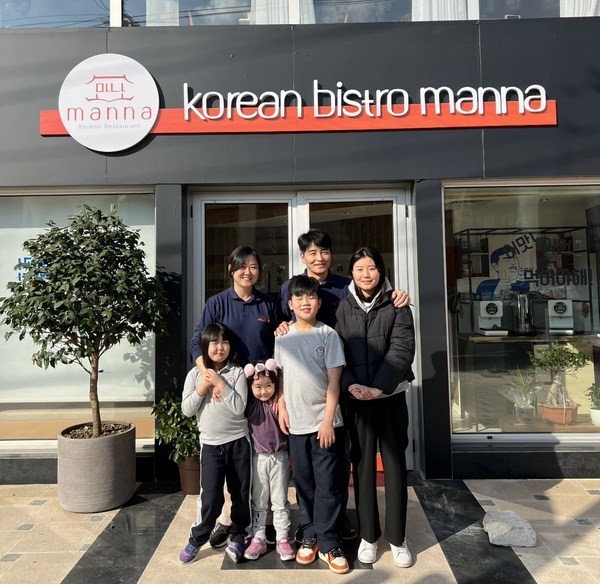
From Palestinian to Korean, Thai, Indonesian, and Mexican in between, I
got to enjoy authentic tastes, so much so that I often felt that I had traveled
within the radius of my neighborhood and transported far away.
As a repatriate in Jordan, sometimes, I miss other authentic tastes
coming from different cultures; while the Kingdom has many amazing and good
quality cuisines, we do have an issue, that often goes under looked: many ethnic
restaurants are not merely studied enough by the perspective of authenticity,
but more or less, what a Jordanian deems an ethnic dish like Mexican, and bam,
it is a Mexican restaurant.
However, the blueprint of our culture and food diversity relies on
staying authentic to our cuisine and not letting others colonize our palettes.
Respect is two-fold, which is why I was happy when I stumbled upon Korean
Bistro Manna.
A small mom-and-pop shop that opened in early December in Swefieh is
owned by a Korean expatriate who speaks better Arabic than I ever will, and the
inspiration behind his restaurant is a unique one: language. And for anyone
asking any further questions, it is also Halal.
Hyungu Lim, better known by his Arabic name, Dawood, came to Jordan as a
language professor and then opened up his language school, where, for 13 years,
he provided a community of language exchange to Jordanians.
When asked about his inspiration, Lim said it came from the students in
school, who would often ask him and his wife to make dishes from Korea. He
added, “The students started asking for Korean food, and then the idea
sparked.”
“My friend was the one who nudged me. Jordan is very expensive in terms
of rent, so I was very hesitant about opening up something, especially since I
have my family to care for, but my friend partnered with me, and it was nice
because we got to do everything by hand.” He continued, “So for the Koreans,
they can come to a spot to feel at home, and for the Jordanians, they can try
something new and do it right here in Jordan if they cannot travel.”
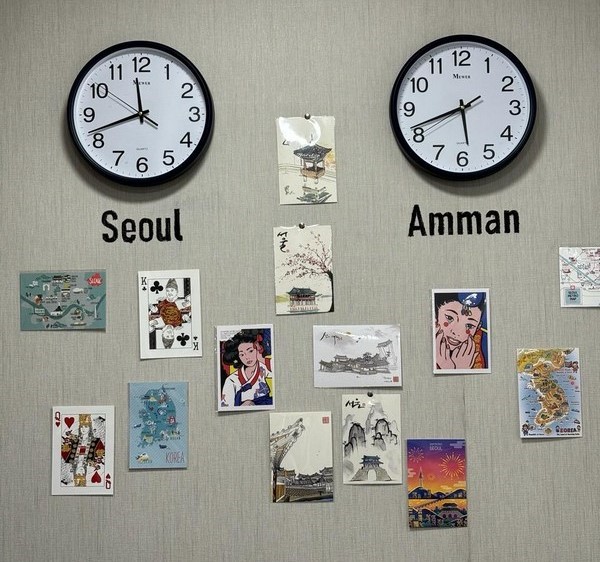 From
Seoul, South Korea’s capital to Amman, Jordan, Korean Bistro Manna brings a mix
of street and traditional food to Amman.
From
Seoul, South Korea’s capital to Amman, Jordan, Korean Bistro Manna brings a mix
of street and traditional food to Amman.
And boy, was this true. On the day I visited, parallel to each other was
a table of no less than ten Jordanians and family members, and right across,
Korean students from the University of Jordan and in the middle, sat myself,
observing it all as people either expanded their tastebuds or simply came to
have something familiar.
The menu is quite extensive and has many Korean staples, like Gimbap and Tteokbokki which many know of Korean cuisine, but also includes some more
traditional staples of the cuisine, one that Lim has added in hopes that
Jordanians may stop by for something they are familiar with but order something
a bit more unique.
He shared this from personal experience, adding that media plays a
significant role in our perception of others. “The media portrays a very bad
image of Arabs overall,” he stated. “But when I came to Jordan, I was able to
open my language center and be the bridge between Koreans and Jordanians, so
from my end, I got to change the image, even if it is just for one person, I
got to share with them the good things that I love about Jordan.”
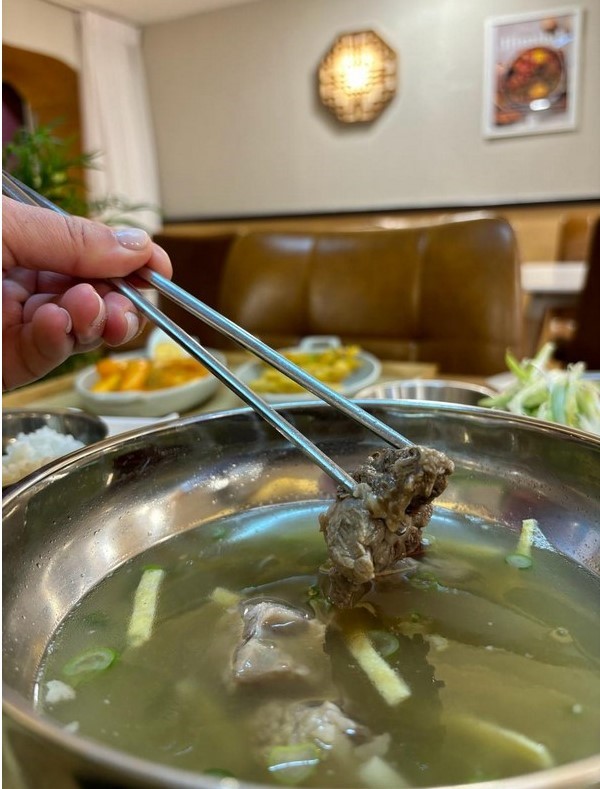
He added, “Secondly, I want to make Korea more accessible. Not everyone
can get to Korea for a vacation or travel, but here, they can escape, just a
little.” While the Kingdom does include a lot of good spots for Chinese and
Japanese, the Korean market is still quite small, but it is also becoming
familiar to many young Jordanians who enjoy watching K-Drama, which has
influenced some of the menu.
Shall we dig
in?Let us start with the familiar. For Lim, these staples on the menu are
more considered Korean street foods that many Jordanians know with the
influence of Korean culture, so these tend to be familiar favorites.
Classic Gimbap:
Gimbap, romanticized as Kimbap, roughly translates to Korean seaweed
rice rolls. When compared to sushi rolls, the seaweed is wrapped on the
outside, and the stuffing on the inside is much more than sushi rolls; also, it
is one of those dishes that can be made utilizing a plethora of ingredients and
items. When I worked at a Hagwon (a Korean for-profit private educational
institution), Kimbap was one of those dishes every Korean student had because
it is a staple, can be easily made, and can use different ingredients.
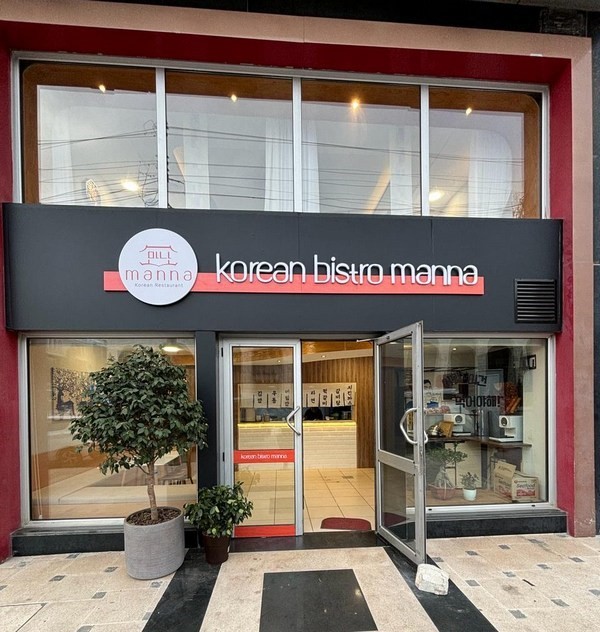 Korean
Bistro Manna exterior, which Lim boasts of having worked on with his own hands
to make the ambiance resemblance a little piece of home.
Korean
Bistro Manna exterior, which Lim boasts of having worked on with his own hands
to make the ambiance resemblance a little piece of home.
Korean Bistro Manna’s classic Kimbap tastes very light and comes with a
broth on the side; it is one of those dishes I would recommend sharing with a
friend as an appetizer. Coming with crab and sausage, I liked the consistency
of the carrots and the little tang they had, as I could tell they were lightly
pickled.
Chicken
GangjeongSweet, crispy Korean fried chicken.
While most fried chicken, white flour, or breadcrumbs, Dakgangjeong is a
bit more unique because it is fried in potato or corn starch, and in some
recipes, it will also call for milk while you let it marinate. Topped with a
sticky, sweet sauce, the result is an absolute delight. The classic has more of
a spicy, sweet flavor, while the honey soy sauce is a bit sweeter and salty.
My take: While I am not a fan of fried chicken, in general, I like their
Chicken Gangjeong because while it is fried, I can tell that it was lightly
fried and not drenched in oil. I appreciate this touch because the focus on the
sauce was really what made me come back, reaching for more, and it was a
perfect ratio of sweet to spicy. Another dish I recommend grabbing as an
appetizer.
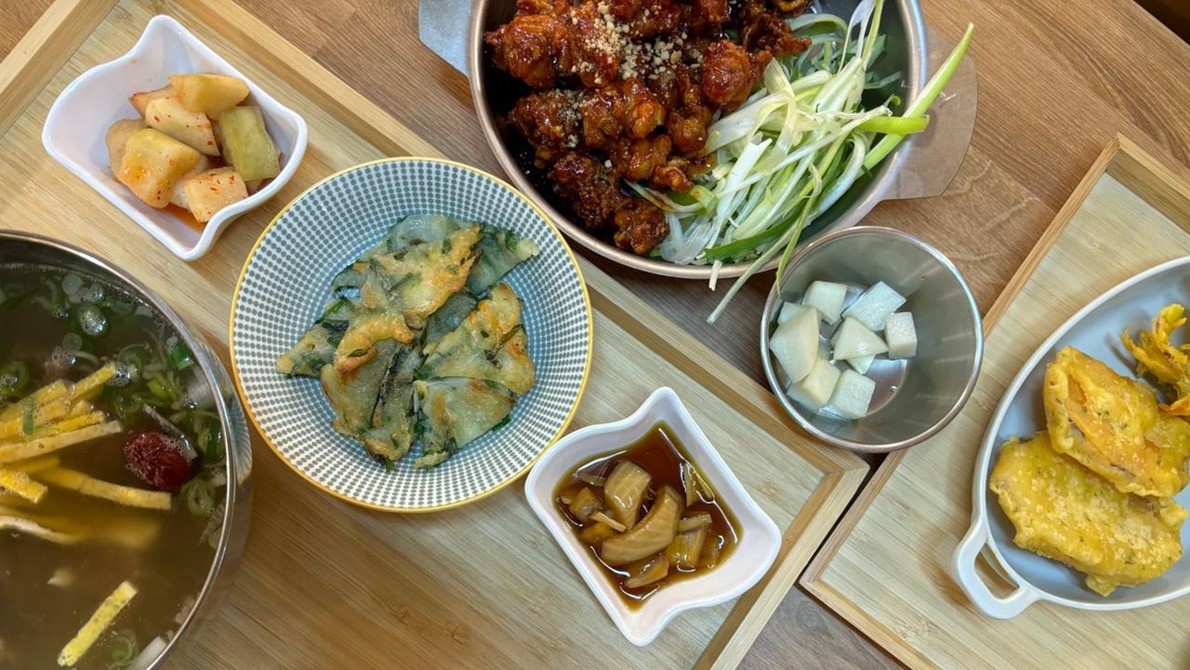 A
little taste of street food and tradition. From top to bottom: Rose Tteobokki, Fried Set, Chicken
Gangjeong, GalbiTang with its sides of pickled daikon, chives, and pickled radish.
Rose Tteobokki
A
little taste of street food and tradition. From top to bottom: Rose Tteobokki, Fried Set, Chicken
Gangjeong, GalbiTang with its sides of pickled daikon, chives, and pickled radish.
Rose Tteobokki
This is where Korean Bistro Manna takes a traditional Korean staple and
adds its own spin by adding Rose sauce, one that Lim would consider the
influence of social media.
Tteobokki are chewy rice cakes that come in the form or look like pasta
noodles. They are glutinous and held together, so they keep their shape and are
quite dense. The more traditional version comes with a Rose sauce, which I
would consider creamy, cheesy, a little spicy, and sweet, rather than the fiery
original version, which, oh my goodness, I had once from one of my students,
and I legit started crying.
What I appreciated about this version is that it is a sauce familiar to
the country but added to a new texture, the Tteobokki, so I think Jordanians
who have had Italian food here in the Kingdom would appreciate its sauce. Also,
the less spicy kick made it more tolerable, and I liked that it was super
creamy and drenched.
Deep Fried Set
This one is very straightforward; it is deep-fried veggies with a nice
sauce on the side and something pickled. It is one of those dishes that Lim
would recommend if you are sharing, or to break up some of the more dishes that
have sauces.
And on to the traditional, here is where I get excited. While I love
Korean street food staples, I am more of a traditional gal.
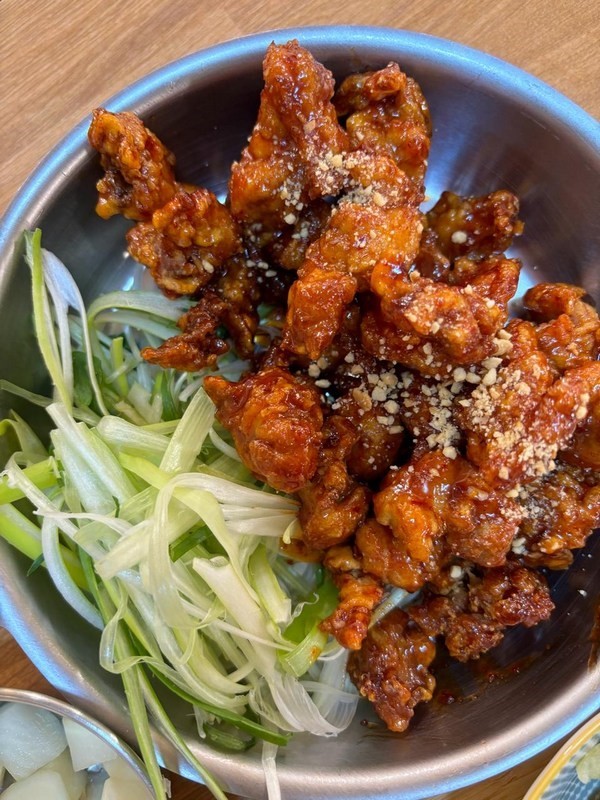 Galbitang
Galbitang
Or what I call the love of my life because it includes one of my
favorite things: broth.
Galbitang, beef short rib soup, is a traditional dish that is very
hearty and nourishing. As the beef gets boiled in the broth for over seven
hours at Korean Bistro Manna, the more it is boiled, the more nutrients you
will take from the collagen of the beef bones.
And the meat for Lim was a challenging meat to find. He added, “I looked
everywhere for short ribs in Jordan but had a very hard time. We source all of
our ingredients, so I ended up finding a butcher in Marka who makes it, and it
was very expensive, but I wanted to make sure that a more traditional item was
included.”
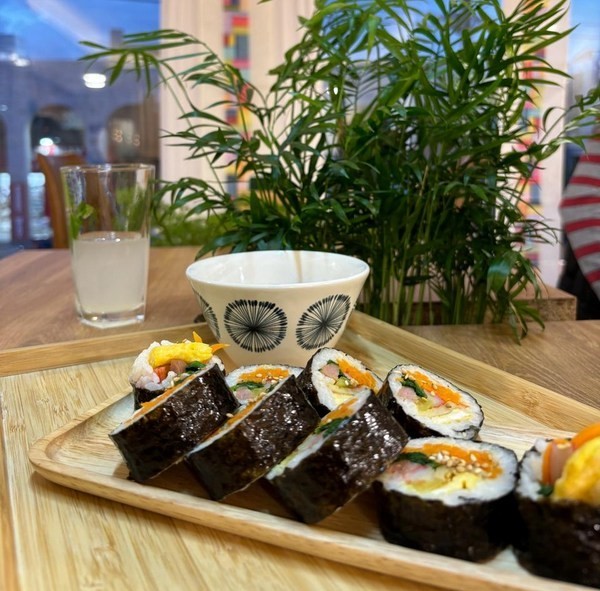
And I appreciate the effort, because mixed with glass noodles and served
with Korean Radish, white rice, and pickled radish, I was actually kind of
upset with myself that I ate so much of the appetizers that I did not savor
this more.
The dish with the starch noodles is so fun; they are clear and just add
an overall nice texture to the dish, and the meat, because of its tenderness
and how it was cared for, does not have that gamey taste that most meats in the
Kingdom do. The Korean sweet potato starch noodles are called dangmyeon.
Chives Jeon
Korean pancakes. Look, I have one easy thing to say, and this is it: if
you are going to a Korean restaurant and not grabbing this, then you are simply
missing out.
Between the onion, the sauce, the lightly fried texture, and everything
far and in between, this is one of those traditional staples that cannot be
missed out on.
The ambiance inside Korean Bistro Manna is just so simple and welcoming.
I appreciated the open kitchen concept when you walked in, watching Lim’s wife
and two other sous chefs put together some really aesthetically pleasing and
simply delicious foods.
Moreover, the homage to wood is a play on the fact that because there
are many forests in Korea, primarily pine, poplar, spruce, and oak, there is
little to no exportation of their woods as they are net importers.
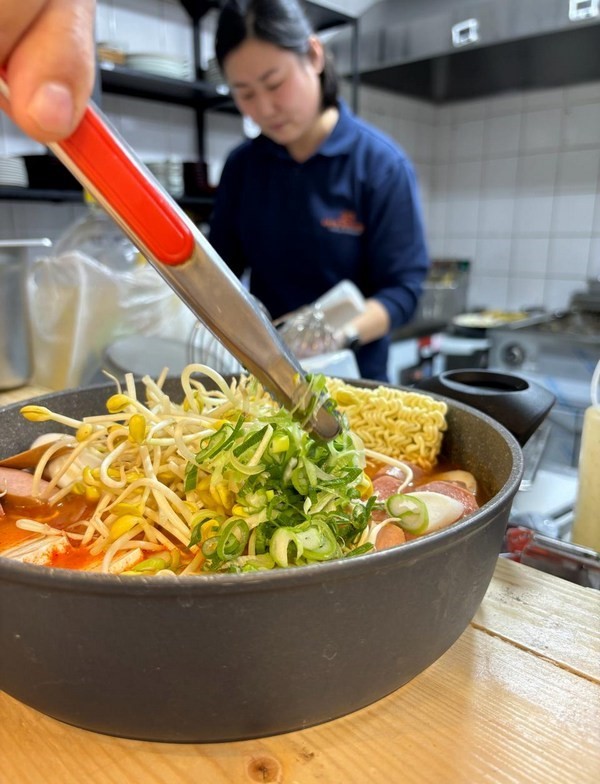
And last but not least, the homemade pickled items are to die for. While
they have been only open for a little over a month, they recently went through
70kg of kimchi, so I think that speaks for itself that it is delicious.
When asked about the future of Korean Bistro Manna, Lim said, “There is
more, I am thinking about adding Korean BBQ and a few other traditional staples
to the menu.”
But for now, they are simply enjoying putting their heart and good foot
forward, as Lim gets distracted by our interview to get up to say hi to a few
of his students, emphasizing the support that they have had on him and the
inspiration that continues to breathe into his restaurant, to share his
culture, and good food.
Read more Good Food
Jordan News



